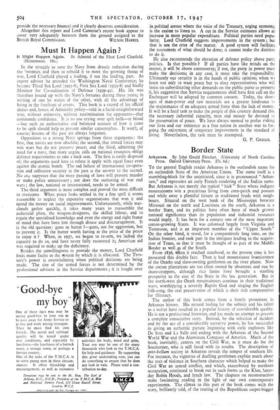Must It Happen Again ?
It might Happen Again. By Admiral of the Fleet Lord Chatfield. (Heinemann. 18s.)
In the struggle to save the Navy from drastic reduction during the 'twenties and then to rebuild it to meet the growing threat of war, Lord Chatfield played a leading, if not the leading, part. As expert adviser he attended the Washington Naval Conference; he became Third Sea Lord (1925-8), First Sea Lord (1933-8) and finally Minister for Co-ordination of Defence (1939-40). His life was therefore bound up with the Navy's fortunes during these years; in writing of one he writes of the other, with all the advantage of being in the forefront of events. This book is a record of his official duties and, hence, of Admiralty policy—told in a lucid straightforward way, without animosity, without recrimination for opponents—that commands confidence. It is no use crying over spilt milk—or blood —but such an authoritative and balanced account of how it came to be spilt should help to prevent similar catastrophes. It won't, of course; lessons of the past are always forgotten. Opposition to a strong Navy springs from three arguments: the first, that navies are now obsolete; the second, that armed forces may win wars but do not preserve peace; and the third, admitting the need for a navy, that more urgent calls on national resources oblige defence requirements to take a back seat. The first is easily disposed of; the arguments used here to refute it apply with equal force even against the atomic bomb. The sad failure of international co-opera- tion and collective security in the past is the answer to the second. No one supposes that the mere passing of laws will prevent murder or make police unnecessary ; nor does the outlawing of war end wars ; the law, national or international, needs to be armed. The third argument is more complex and proved the most difficult to overcome. When peace looks settled in for a fine spell it seems reasonable to neglect the expensive organisations that won it and spend the money on social improvements. Unfortunately, while war- clouds gather quickly, it takes many years to reassemble the industrial plant, the weapon-designers, the skilled labour, and to regain the specialised knowledge and even the energy and right frame of mind that have been lost through disuse and discouragement. It is the old question: guns or butter ?—guns, not for aggression, but to prevent it. Is the butter worth having at the price of the peace to enjoy it ? When, in 1937, we began to re-arm, we lacked the capacity to do so, and have never fully recovered it; American aid was required to make up the deficiency. Besides the unwillingness to provide the money, Lord Chatfield finds many faults in the /ystem by which it is allocated. The Trea- sury's power is overwhelming when political decisions are being made. The size of the armed forces is not determined by the professional advisers in the Service departments ; it is fought over in political arenas where the voice of the Treasury, urging economy, is the easiest to listen to. A cut in the Service estimates allows an increase in more popular expenditure. Political parties need popu- larity. Lord Chatfield suggests improvements in the system ; but that is not the crux of the matter. A good system will facilitate the assessment of what should be done; it cannot make the decision to do it.
He also recommends the elevation of defence policy above party politics. Is that possible? If all parties have like minds on the matter' it will be above controversy; if not, the party in power must make the decisions; in any case, it must take the responsibility. Ultimately our security is in the hands of public opinion; when we learn not only to want peace but to elect representatives who will insist on subordinating other demands on the public purse to preserve it, his suggestion that Service requirements shall have first call on the Exchequer will be adopted by common consent. Today, the short- ages of man-power and raw materials are a greater hindrance to the maintenance of an adequate armed force than the lack of money. It will be a hard task to make the people of this country demand that the necessary industrial capacity, men and money be devoted to the preservation of peace. We have always seemed to prefer risking our lives and our existence as a free nation in another war to for- going the enjoyment of temporary improvement in the standard of living. Nevertheless, the task must be attempted.
G. P. GRIGGS.


































 Previous page
Previous page